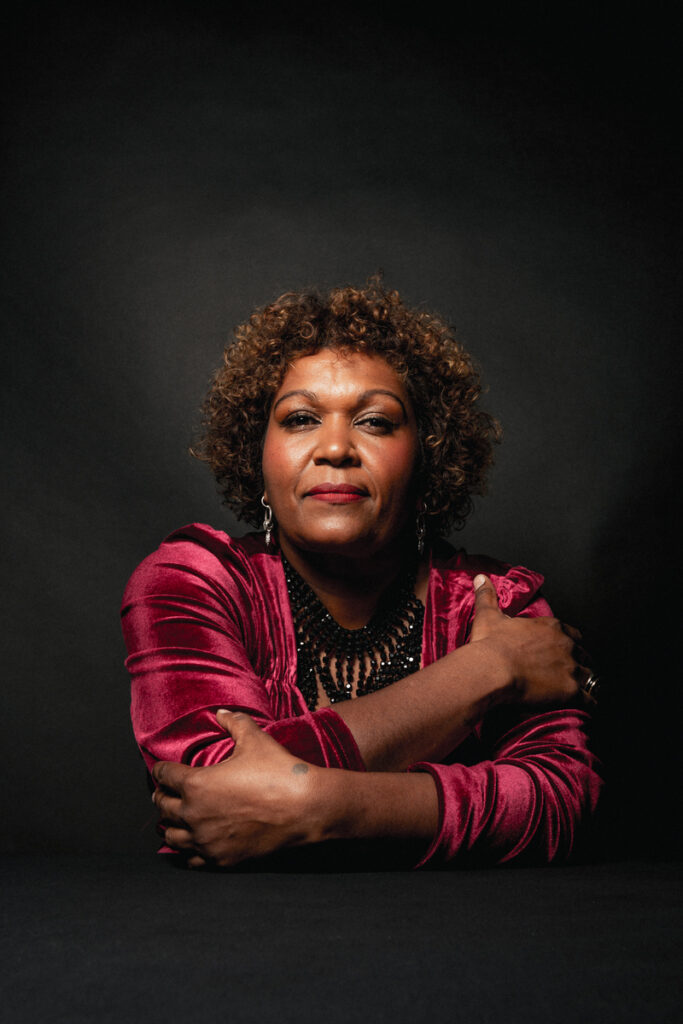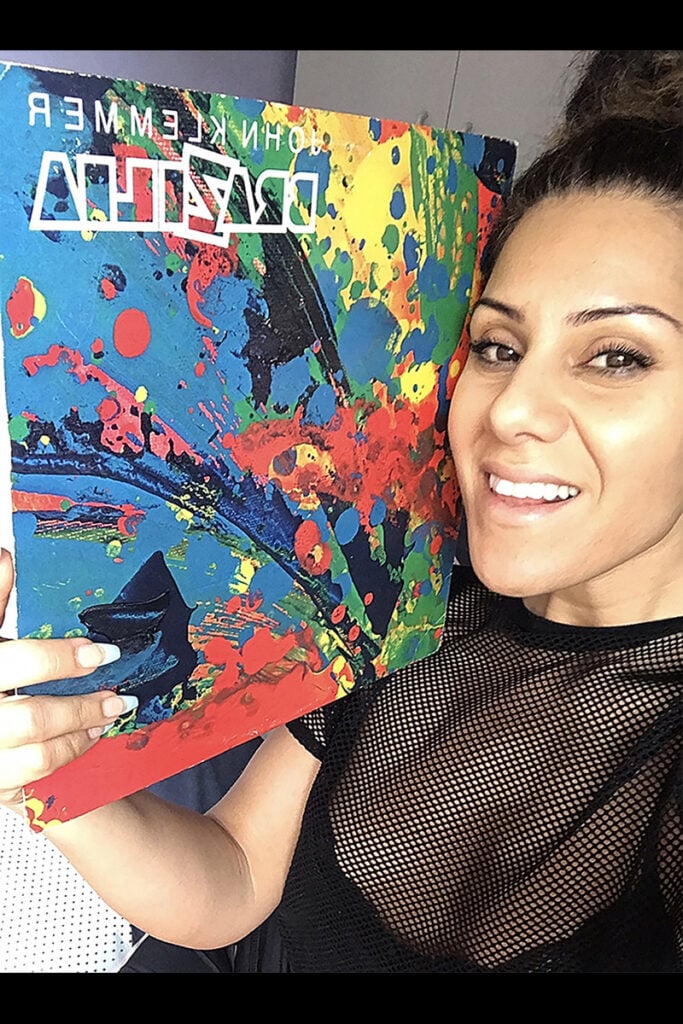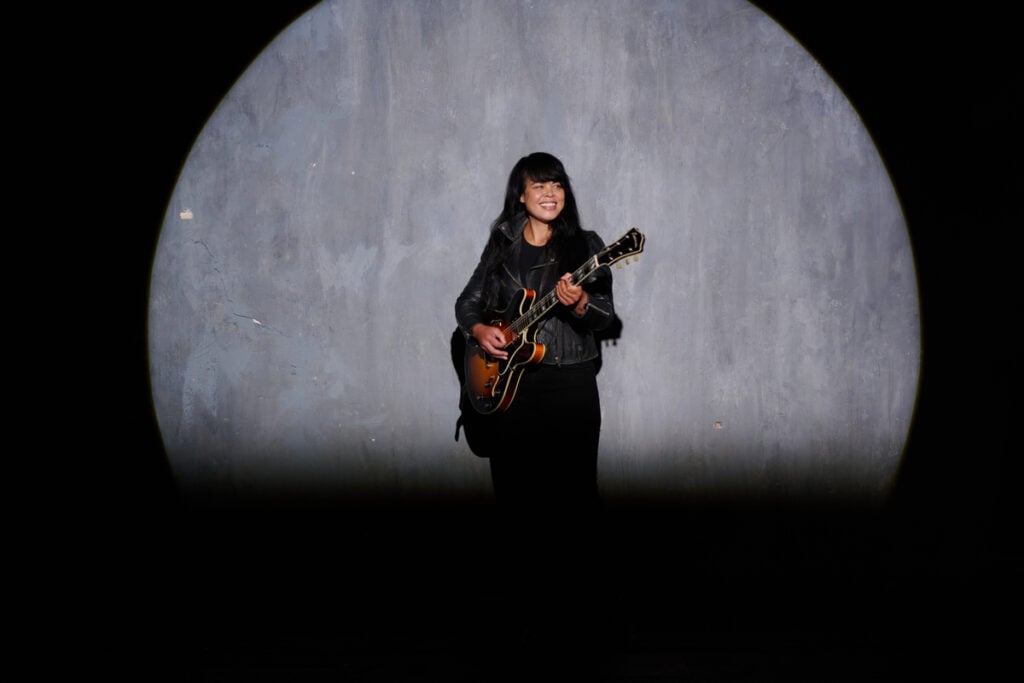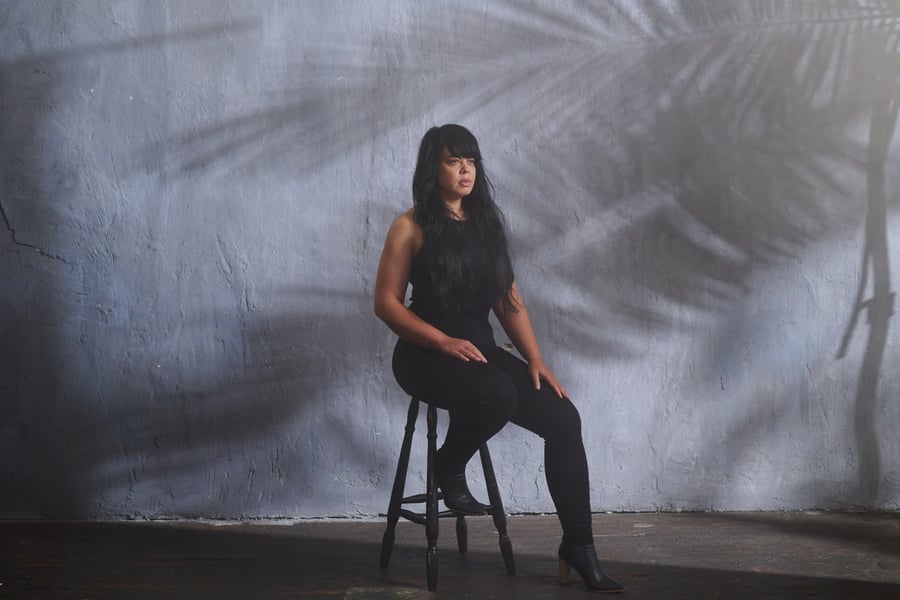Karen Lee Andrews bid farewell to her beloved grandfather at 11. Inside a sterile ward at St. Vincent’s Hospital in Sydney, she and her relatives stood vigil, chanting time-honoured hymns as he faced his final days. Their harmonies were so soothing that nurses asked her uncle, a classically-trained opera singer, if the tight knit Tongan family could serenade other hospice patients.
“He turned to only me and said, ‘Karen, let’s go.’ We went around, and I sang to people as they passed over,” the musician recalls, now in her forties. “I knew then there was something different about me.”
Andrews’ parents enrolled her in the Wollongong Conservatorium of Music, but instructors, including private tutors, struggled with her low vocal register. Additionally, her strict, born-again Christian upbringing hindered any professional ambitions. In her early twenties, Andrews found a home for her booming voice in soul music, inspired by fellow church-honed contraltos Etta James and Nina Simone. “It felt natural,” she reflects.
Soul music, arising in the late 1950s within African American communities, marked a vibrant secularisation of gospel intertwined with rhythm and blues. A stirring soundscape for the Civil Rights movement, it underscored Black people’s arduous struggle for equal rights under United States law. Since its halcyon days in the Sixties, the genre has birthed several sub-categories like Motown, Latin soul, quiet storm and neo-soul.
One distinct variety, blue-eyed soul, includes among its most adored proponents Renee Geyer, the late powerhouse who described herself as “a white Hungarian Jew from Australia sounding like a 65-year-old Black man from Alabama”. Geyer’s birthplace, Melbourne, is regarded as soul music’s Down Under headquarters, giving rise to Vika and Linda, Kylie Auldist, Ella Thompson, Thando, WILSN, Mo’ju and more. It’s where Gumbaynggirr and Yamatji woman Emma Donovan teamed up with The Putbacks, an outfit influenced by acclaimed Memphis-based label Stax Records.

Emma Donovan
“As a performer, the Aboriginal community is my safe space, but being in Melbourne and working with The Putbacks was very cool,” says Donovan, who grew up singing country and folk with her cherished family band, The Donovans. During The Putbacks’ 2012 Woodford Folk Festival performance, Donovan connected offstage with Saundra Williams and Starr Duncan Lowe, renowned as The Dapettes, backup vocalists for headliner Sharon Jones and the Dap-Kings. Their conversations touched on soul music’s international mark and its interpretation within Indigenous cultures.
“It’s amazing how far the music has travelled,” Donovan says. “When I think of songs I’ve written and been a part of, I think about how much we relate soul music to being on country. It’s all soulful, from our Dreaming storytelling to how we connect.” Andrews, a Polynesian woman, “regularly addresses” how she represents the Black art form. “Gospel music, blues, soul and jazz were born out of oppression, and I will always be respectful, mindful and aware of that,” she says.
Love Music?
Get your daily dose of everything happening in Australian/New Zealand music and globally.
“Whenever I sing an Aretha [Franklin] or Nina [Simone] song, even my songs, I understand it’s not from me and my standalone talent. I’ve been taught by people who experienced such hardship that something meaningful has come out of them and impacted the world so that you just want to grab and hold onto it.”
The finest soul artists pour their hearts out on stage, and Andrews is no exception. Despite her demanding tour schedule’s emotional toll (“Needing to be switched on, and sometimes on demand, doesn’t always work out how you want it to”), she considers it an essential aspect of her calling.
“My audience works, and they have families and priorities. I respect, value and appreciate that they spend their money to come and see me,” she says. “It’s important that when they walk out, they don’t feel they were ‘sang on’; there is a real interaction, a real exchange.”
With an unshakable spotlight on stars like Beyoncé, Taylor Swift and Adele, the music industry can present a façade of gender progressiveness. Closer examination reveals persistent disparities in crucial roles such as songwriting, sound engineering and producing. Women from marginalised backgrounds — those of colour, LGBTQI+ women, and individuals with disabilities —face even steeper obstacles. This reality is evident in Australia, where our rich tapestry of musical heritage remains overshadowed.
According to radio host, singer and co-founder of Sydney-based collective Sisters With Soul, Tanya Rahme, supply and demand hinders local soul music’s ascent compared to, say, Los Angeles or Berlin. “Apart from access to live venues being almost impossible to book, the lack of sponsorship and forward drive given to our artists, in a moment in time where pop and hip-hop and TikTok 25-second song trends saturate fans, is where I see the most significant disconnect,” she says.

Tanya Rahme
“Only now have I, an Aboriginal woman in my forties, working for decades, been offered the opportunity to record my first solo album,” says Donovan. She notes the unrest surrounding last year’s divisive Australian Indigenous Voice Referendum made it especially tough for Blak entertainers. She compares their creative resilience to the sanctity of parenthood. “As a mum, you never stop. You continue to put food on your table and clothes on your kids’ backs. You’ve got to be determined, and that’s what I am; that’s what our mob are in the arts scene. We get up and come back stronger.”
The Australian Recording Industry Association (ARIA) charts for 2023 marked a historical low point for Australian music, with no domestic entries featured among the Top 100 singles or albums released that year. Addressing this issue requires a concerted effort to support Australian musicians, including helping them navigate the eligibility requirements for chart inclusion and facilitating listener relationships.
“We have incredibly talented, world-class soul performers who still face significant discoverability issues in new Australian music,” says ARIA CEO Annabelle Herd, who works closely with bodies like Music Australia and Sound NSW to establish the proper infrastructure and “give these incredible women the best chance of crossing over with mainstream audiences to achieve sustainable commercial success.”
Rahme suggests aspiring artists must “network, socialise and create an online presence. Surround yourself with like-minded, positive women, and find opportunities to perform together at events or open mics, both great ways to gain experience and exposure.” Andrews is pragmatic, reasoning that female soul acts should be realistic about existing on the industry’s fringes and embrace it. “Understand where you sit in the space and work from there,” she says. “Hope is in comprehending the realities of it.”
“I think about those who came before us, fighting to keep our say alive,” Donovan says. “I call it the ‘Blakfulla Blues’, music from women like Aunty Ruby Hunter and Tiddas. This new generation, like Emily Wurramara and Thelma Plum, makes a lot of noise and is free to say what we need. As an older Aboriginal woman, I’m so proud of that.”
Herd says, “The last 12 months have seen Australian soul and R&B step into the spotlight,” with ARIA finding ways to better advocate, educate, and showcase the artists making waves here and overseas. Soul has long been a fixture in our premier festivals, including Byron Bay Bluesfest, Splendour in the Grass and Falls Festival.
There’s been a noticeable shift towards catering to a younger demographic, typified by the emergence of circuit newcomers like Souled Out Festival (their 2024 lineup featured Summer Walker, Libianca and local act Lara Andallo). “The reaction to this year’s announcement was one of the biggest we’ve seen,” says co-founder Emal Naim. “Witnessing it near sell out shows that both modern and throwback R&B is alive.”
Soul music’s essence is a balm as we grapple with the aftermath of a devastating pandemic and pervasive issues such as global conflicts and rising living costs. “Soul music hits a different corner of the heart,” says Andrews. “People who come to my shows need that moment to be fed. I like to have the lights on a little to see them. The receiving and giving is everything.”

Karen Lee Andrews
This article features in the June-August 2024 issue of Rolling Stone AU/NZ. If you’re eager to get your hands on it, then now is the time to sign up for a subscription.
Whether you’re a fan of music, you’re a supporter of the local music scene, or you enjoy the thrill of print and long form journalism, then Rolling Stone AU/NZ is exactly what you need. Click the link below for more information regarding a magazine subscription.



































